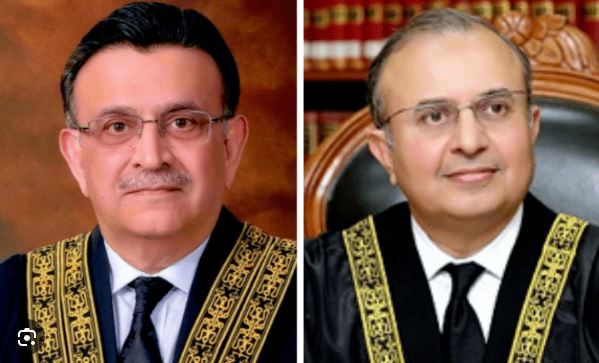ISLAMABAD, AUG 18: Justice Mansoor Ali Shah said on Friday that a full court should hear PTI Chairman Imran Khan’s plea challenging amendments to the accountability laws.
Justice Shah was part of a three-member Supreme Court (SC) bench, comprising Chief Justice of Pakistan (CJP) Umar Ata Bandial and Justice Ijazul Ahsan, that took up Imran’s plea, which was filed last year in June.
After coming to power in April last year, the then PDM government passed the National Accountability (Second Amendment) Act 2022 — a move that was heavily criticised by PTI, which termed the legislation an attempt to turn the anti-graft watchdog into a “toothless” organisation.
In June, the former prime minister challenged the amendments to the NAB ordinance, arguing that it is a violation of fundamental rights. The petition stated that the amendments will “virtually eliminate any white-collar crime committed by a public office holder”.
At the outset of the hearing, Justice Shah said that the case concerning the Supreme Court (Practice and Procedure) law, the implementation of which was frozen by the apex court before it came into force, should have been heard by a full court.
“After the introduction of the law, [this] case should also be heard by a full court,” Justice Shah said.
He noted that the case had still not been decided, noting that the matter would have been different if it had. He urged the CJP to constitute a full court to hear the plea challenging amendments to the National Accountability Bureau (NAB) law.
Meanwhile, CJP Bandial remarked that the parties in the case should present their final arguments in the case at the next hearing. “This case is pending since 2022. No one has challenged changes to the NAB law made in 2023,” he observed.
Justice Ahsan observed that each case had its own facts and merits. “The opinion given in one case is only for that case,” he said.
CJP Bandial then remarked when there is a difference of opinion, the decision is taken by the majority. He further said that the petitioner had presented their arguments over 22 hearings while the federal government had done the same over 19 hearings. “This case was not that long,” he said.
During the hearing, Justice Shah also noted that he had been asking since day one about which fundamental rights were affected. “In 47 hearings, it has not been told which fundamental rights have been affected,” he said.
CJP Bandial then asked the federal government lawyer Makhdoom Ali Khan why he was shying away from presenting arguments “on merit”. To this, the lawyer responded that he was not shying away from doing so but raising the inadmissibility of the plea was his responsibility.
“Why are you trying to leave the hearing,” CJP Bandial asked, to which the counsel said that the court had the right to either accept or reject his argument.
Furthermore, the PTI chief’s lawyer Khawaja Haris did not appear for today’s hearing with his assistant, Yasir Aman, appearing on his behalf. The latter told the court that detailed responses from their side had been submitted.
CJP Bandial then said that the court would decide the case after conducting daily hearings. Justice Shah also sought arguments on whether the current bench could hear the case after the Supreme Court (Practice and Procedure) law.
“My retirement is near,” CJP Bandial said, adding that it would be a source of shame for him if the case was not decided. “It is an important case and is being heard for a long time. There was no debate over the Supreme Court (Practice and Procedure) law in the court,” he said.
The hearing of the case was then adjourned till August 28.
NAB law amendment
The NAB (Second Amendment) Bill 2021 states that NAB’s deputy chairman, to be appointed by the federal government, would become the acting chairman of the bureau following the completion of the tenure of the chairman.
The bill has also reduced the four-year term of the NAB chairman and the bureau’s prosecutor general to three years. After approval of the law, NAB will not be able to act on federal, provincial or local tax matters. Moreover, the regulatory bodies functioning in the country have also been placed out of NAB’s domain.
It says that “all pending inquiries, investigations, trials or proceedings under this ordinance, relating to persons or transactions … shall stand transferred to the concerned authorities, departments and courts under the respective laws.”
It has also set a three-year term for the judges of the accountability courts. It will also make it binding upon the courts to decide a case within one year. Under the proposed law, it has been made binding upon NAB to ensure the availability of evidence against an accused prior to his or her arrest.
According to one of the key amendments, the act “shall be deemed to have taken effect on and from the commencement of the National Accountability Ordinance 1999”.

















